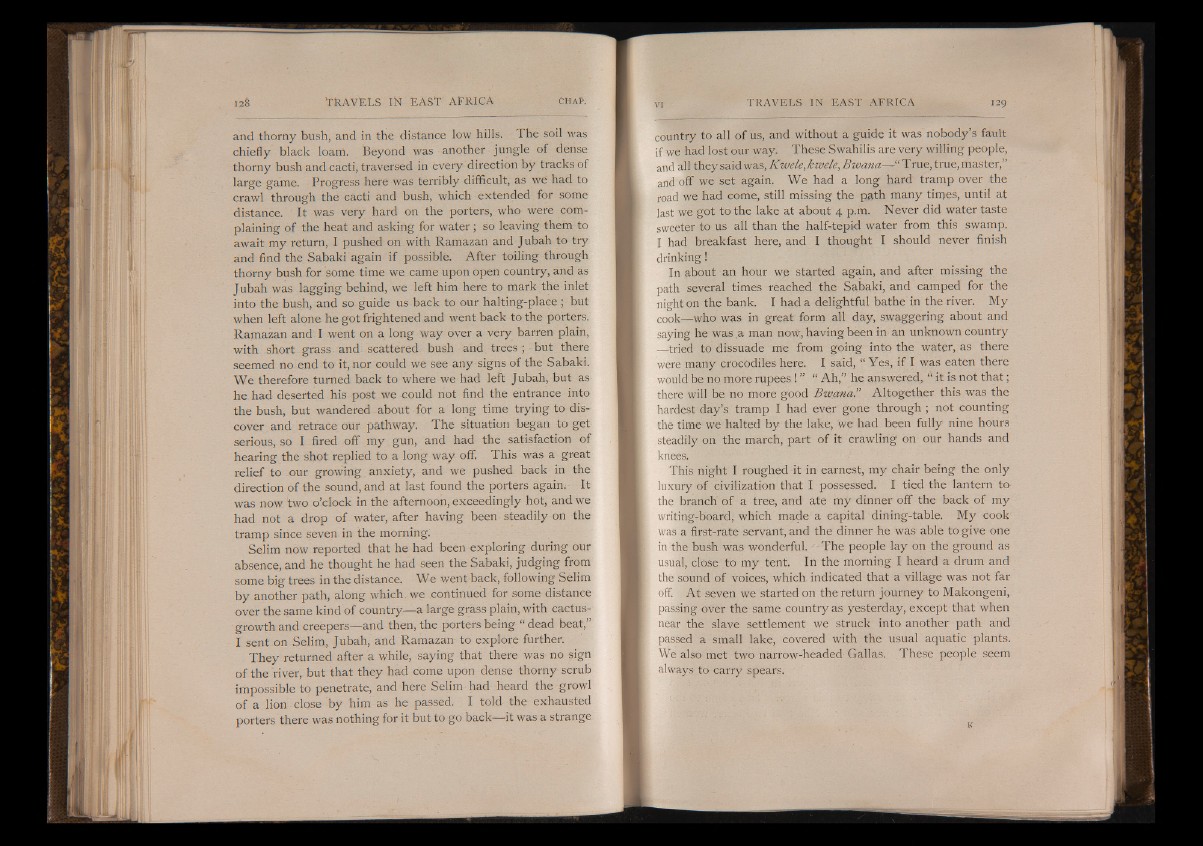
and thorny bush, and in the distance low hills. The soil was
chiefly black loam. Beyond was another jungle of dense
thorny bush and cacti, traversed in every direction by tracks of
large game. Progress here was terribly difficult, as we had to
crawl through the cacti and bush, which extended for some
distance. It was very hard on the porters, who were complaining
of the heat and asking for water; so leaving them to
await my return, I pushed on with Ramazan and Jubah to try
and find the Sabaki again if possible. After toiling through
thorny bush for some time we came upon open country, and as
Jubah was lagging behind, we left him here to mark the inlet
into the bush, and so guide us back to our halting-plaee ; but
when left alone he got frightened and went back to the porters.
Ramazan and I went on a long way over a very barren plain,
with short grass, and scattered bush and trees ; but there
seemed no end to it, nor could we see any signs of the Sabaki.
We therefore turned back to where we had left Jubah, but as
he had deserted his post we could not find the entrance into
the bush, but wandered about for a long time trying to discover
and retrace our pathway. The situation began to get
serious, so I fired off my gun, and had the satisfaction of
hearing the shot replied to a long way off. This was a great
relief to our growing anxiety, and we pushed back in the
direction of the sound, and at last found the porters again. It
was now two o’clock in the afternoon, exceedingly hot, and we
had not a drop of water, after having been steadily on the
tramp since seven in the morning.
Selim now reported that he had been exploring during our
absence, and he thought he had seen the Sabaki, judging from
some big trees in the distance. We went back, following Selim
by another path, along which, we continued for some distance
over the same kind of country— a large grass plain, with cactus-
growth and creepers— and then, the porters being “ dead beat,”
I sent on Selim, Jubah, and Ramazan-to explore further.
They returned after a while, saying that there was no sign
of the river, but that they had come upon dense thorny scrub
impossible to penetrate, and here Selim had heard the growl
of a lion close by him as he passed. I told the exhausted
porters there was nothing for it but to go back— it was a strange
country to all of us, and without a guide it was nobody’s fault
if we had lost our way. These Swahilis are very willing people,
and all they said was, Kwele, kwele, Bwana—ITrue, true, master,”
and off we set again. We had a long hard tramp over the
road we had come, still missing the path many times, until at
last we got to the lake at about 4 p.m. Never did water taste
sweeter to us all than the half-tepid water from this swamp.
I had breakfast here, and I thought I should never finish
drinking!
In about an hour we started again, and after missing the
path several times reached the Sabaki, and camped for the
night on the bank. I had a delightful bathe in the river. My
cook—who was in great form all day, swaggering about and
saying he was a man now, having been in an unknown country
—tried to dissuade me from going into the water, as there
were many crocodiles here. I said, “ Yes, if I was eaten there
would be no more rupees ! ” “ Ah,” he answered, “ it is not that;
there will be no more good Bwana!' Altogether this was the
hardest day’s tramp I had ever gone through ; not counting
the time we halted by the lake, we had been fully nine hours
steadily on the march, part of it crawling on our hands and
knees.
This night I roughed it in earnest, my chair being the only
luxury of civilization that I possessed. I tied the lantern to
the branch of a tree, and ate my dinner off the back of my
writing-board, which made a capital dining-table. My cook
was a first-rate servant, and the dinner he was able to give one
in the bush was wonderful. - The people lay on the ground as
usual, close to my tent. In the morning I heard a drum and
the sound of voices, which indicated that a village was not far
off. At seven we started on the return journey to Makongeni,
passing over the same country as yesterday, except that when
near the slave settlement we struck into another path and
passed a small lake, covered with the usual aquatic plants.
We also met two narrow-headed- Gallas. These people seem
always to carry spears.